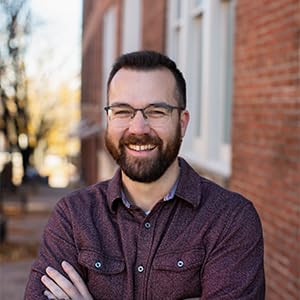
Single greatest mistake in the entire history of Westorn thought
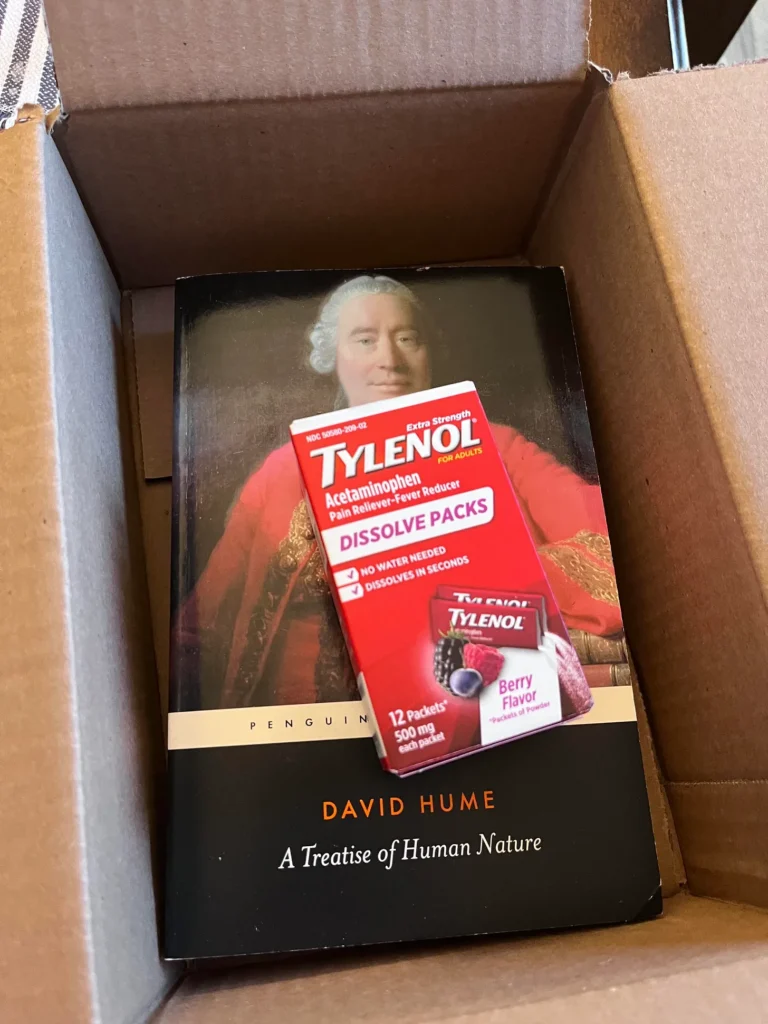
This Fall two worlds converged. On the one hand, I am writing on the doctrine of creation in my Systematic Theology (Baker Academic). To that end I have not only been deep in conversation with church fathers like Augustine (and his Genesis commentary) but Joseph Ratzinger and his books, The Divine Project: Reflections on Creation and the Church and In the Beginning. Ratzinger still speaks today because he is a megaphone in a world whose cosmology is indebted to modernism, at points boldly addressing our present departure from a classical understanding of the cosmos. Modernism’s break with Aristotle’s cosmos of causality is a crack in the foundation that Christians today still struggle to concede, but it will be one I force my readers to face head on, however uncomfortable it may be. I am reminded of Edward Feser’s sobering statement:
“Abandoning Aristotelianism, as the founders of modern philosophy did, was the single greatest mistake ever made in the entire history of Western thought.”
If you think Feser is exaggerating, finish his book The Last Superstition first. In that light, I’ve been spending my time representing David Hume’s attack on causality to my reader, which has motivated me to return to his book, A Treatise on Human Nature (so when I opened this Amazon delivery package I couldn’t help but laugh because it is a visual summary of how the story ends…as well as how bad my head hurts as a result).
On the other hand, I was invited to speak to students at Benedictine College. (Yes, Benedictine is the college where Harrison Butker from the Chiefs gave his heard-around-the-world graduation address. And yes, I am devasted to hear the news that Butker is out for who knows how long with a knee injury. With half of the team on IR it is almost miraculous the Chiefs are undefeated.) I was asked to speak on my book, The Reformation as Renewal (my gratitude to Tory Baucum and his hospitality). I thought the Reformed Scholastics and their retrieval of Thomas Aquinas to be a strategic topic (even test case). Imagine this: Roman Catholic college students meeting Jerome Zanchi or John Owen for the first time, only to discover that Thomism was instrumental to the Protestant defense of everything from scholastic realism to Nicene orthodoxy to the classical Christian doctrine of creation ex nihilo and more. John Owen proved most helpful because even in areas of soteriology he exhibits a critical appropriation of Aquinas that is judicious.
But I discovered that at the end of my talk Ratzinger once again proved relevant. He did not hesitate in his day to critique Karl Rahner’s approach to ecumenism, an approach that tended to sideline dogmatics for the sake of institutional unity. Ratzinger could not see how Rahner’s approach could lead to anything but skepticism. By contrast, Ratzinger proposes a “mutual giving” whereby Protestants and Roman Catholics do not forfeit their principles but nonetheless consider how they might benefit one another where the other finds itself weak against the battle hammer of modernism. Thus began a fruitful comparison of the Reformed Scholastic use of Aquinas to withstand the intrusion of Socinianism and today’s evangelical struggle to survive the influx of theistic mutualism in our own ranks.
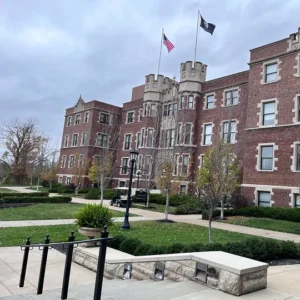

Afterwards I talked to some of these college students and I was impressed, even encouraged, by their humble resolve: we both agreed that we cannot afford to ignore each other when those in the church and academy alike are increasingly drowning in the waters of nominalism and secularism. (By the way, if you want to learn more about “mutual giving” don’t overlook the Roman Catholics and Protestants that Matthew Levering brought into conversation with one another in his book, Joseph Ratzinger and the Healing of Reformation Era Divisions, including Protestants like Douglas Sweeney, Timothy Larsen, David Luy, and others). To be transparent, I am still considering where in my systematic my reading of Ratzinger will be most relevant, but my hunch is right after the reader has felt the full impact of the blitz by Hume and Kant, as well as Darwin and Dawkins. If we do not see our need for retrieval after Empiricism, Positivism, and Materialism, then I don’t know if we ever will.
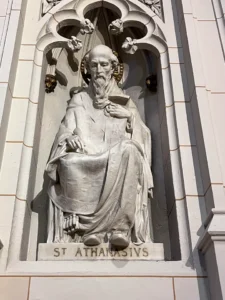
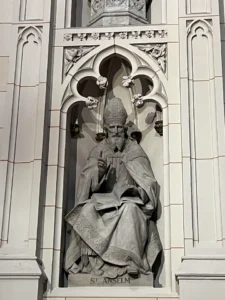
In other news, I just returned from New York City. I’m afraid there is so much to tell (especially my bizarre encounter with both Darwinism and Intelligent Design at the Natural History Museum) that I will have to save it for another newsletter. But between walks in Central Park, visiting Central Presbyterian Church, and my days living at the MET, I have much to share. One glimpse: I happened to stumble into St. Patrick’s Cathedral during a wedding. I apologize to the bride and groom. However, I did manage to meet some friends perched high in the nave: Basil the Great, John Chrysostom, Gregory of Nazianzus, Athanasius, Bonaventure, Bernard, and yes, my closest friend, Anselm. I wonder how many churchgoers look up at Athanasius on their way into church to say the Nicene Creed.
Before I sign off, here’s what I’m up to next: First, next week the Center for Classical Theology meets, and we get to hear from Michael Horton, G.K. Beale, and Michael Allen. If you are going to ETS in San Diego, then come the night before. Register asap!Crossway is giving away some good books.
Second, I had a friendly conversation with two of my PhD graduates now off teaching at other institutions, Sam Parkison and Ronni Kurtz, about my Systematic Theology on the Credo Podcast. What fun thinking together about what the ST will look like.
Third, I can’t tell you how much I am looking forward to the Credo Conference. I keep telling people: bring a group and get a discount. Come join me, Gavin Ortlund, Kevin DeYoung, Fred Sanders, Michael Horton, Michael Reeves, and others. Register today.
I will be back soon to tell you how CCT went. And yes, it will be nice to be back in sunny southern California, my home state. I plan to visit In-N-Out burger at least once. Last thing, I started Credo over a decade ago and I’ve kept it free since. But we just started a donation page. As the holidays approach, would you consider giving Credo a Christmas gift? Your contribution helps us make everything from the podcast to the magazine to the conference happen.
